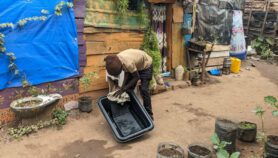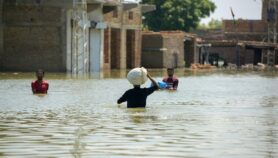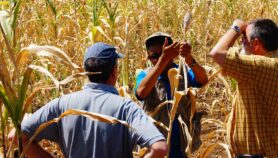By: Tom Mboya
Send to a friend
The details you provide on this page will not be used to send unsolicited email, and will not be sold to a 3rd party. See privacy policy.
[NAIROBI] Some of the farmers who lost their crops in the Horn of Africa drought this year may be able to afford farming next season, with the help of a ‘micro-insurance’ scheme.
Kilimo Salama — Swahili for ‘safe farming‘ — was launched last year, providing small-scale farmers in Kenya with crop insurance by combining mobile phone payment with the data from automated weather stations.
Farmers register with one of 30 solar-powered weather stations, each covering a 15–20 kilometre radius, and purchase insurance when buying seeds and fertilisers. Kilimo Salama uses data from these stations to calculate the severity of droughts — or excessive rainfall. Eligible farmers then receive payouts via their mobile phones.
In March, it paid out US$3,135 each to more than 1,200 farmers for losses after lack of rain, and more than 1,400 farmers received US$9,230 each in September because of prolonged droughts that caused crop failure.
"Since its inception, the project has been a big success," said Wairimu Muthike, project’s lead field coordinator.
He added: "The number of farmers willing to protect their crop by insuring their farm investments has increased tremendously. The sum insured among interested farmers has also been growing."
According to Wairimu, the best indicator that the project is succeeding is the number of larger-scale farmers it is attracting.
Finance is entirely derived from the premiums collected from farmers, according to Rahab Wambui, a field coordinator with the project, rather than coming from commercial or charitable sources.
"This will result in the sustainability of the programme," she said.
The project initially enrolled 9,000 farmers but the number has increased to 21,341 this year. In 2009-2010 it targeted maize, but this year it expanded to include wheat, beans, and sorghum.
"Many farmers find this to be an effective way of ensuring that, when adverse effects of nature set in, they can find an alternative source of funding in order to cultivate again," said Silas Waweru, a farmer who has benefited from the payout.
Wairimu said that potential plans for spreading the programme to other countries were still classified.
The Horn of Africa has been hit by the worst drought in 60 years, according to the UN. It has caused a widespread famine affecting millions of people, despite having been forecast months in advance.
Livestock farmers in Kenya are expected to find out about their claims from another, satellite-based insurance scheme this month.
See below for a video about Kilimo Salama:













